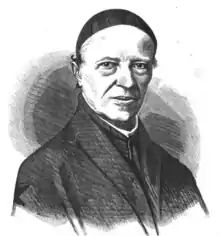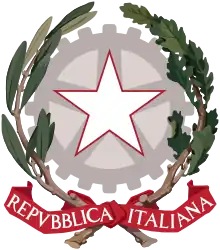Antonio Bresciani | |
|---|---|
 Antonio Bresciani | |
| Born | Antonio Bresciani Borsa 24 July 1798 Ala, Trentino, Holy Roman Empire |
| Died | 14 March 1862 (aged 63) Rome, Papal States |
| Resting place | Church of the Gesù |
| Pen name | Tionide Nemesiano |
| Occupation |
|
| Language | Italian |
| Nationality | Italian |
| Period | 1838–1862 |
| Genre | |
| Literary movement | |
| Notable works | L'Ebreo di Verona |
| Parents | Leonardo Bresciani and Vittoria Bresciani (née Alberti) |
| This article is part of a series on |
| Conservatism in Italy |
|---|
 |
Antonio Bresciani Borsa (Italian pronunciation: [anˈtɔːnjo breʃˈʃa.ni ˈbor.sa]; 24 July 1798 – 14 March 1862) was an Italian Jesuit priest, novelist and journalist, mostly known for his reactionary diatribes against liberalism and the Risorgimento.[1]
Biography
Antonio Bresciani was Born into an impoverished noble family in Ala, near Trento, in 1798. In 1814, he moved to Verona and attended the St. Sebastian College. Following the completion of his studies there, in 1818 he joined the Seminary of Verona, where he studied theology. Ignoring his father's wishes that he become a lawyer,[2] in 1821 he was ordained priest in Brixen. Once ordained, he travelled to Rome with the intention of entering the Society of Jesus. In 1824, he was admitted to the Jesuit novitiate of St. Andrew. In 1826, Bresciani gained his father's permission to enter the Jesuit order and in 1828 he made his religious vows as a Jesuit in the house of novitiate in Chieri.[3] Then he was sent to Genoa to the Jerome’s Academy. Between 1834 and 1848 as rector, he moved from one college to another around Italy: in 1834 at the Carmine College in Turin, in 1837 at the College of St. Bartholomew in Modena and in 1846 at the Pontificio Collegio Urbano de Propaganda Fide.
On 9 January 1850, he was invited to Naples to take part in the first meeting of the editorial board of the review La Civiltà Cattolica. His task was to write novels. When he joined the founders of La Civiltà Cattolica Bresciani already had a large literary production and was a member of the prestigious Academy of Arcadia, under the pseudonym Tionide Nemesiano.
During his tenure as literary editor at La Civiltà Cattolica, Bresciani launched his serialised trilogy of anti-Masonic novels: The Jew of Verona (1851), The Roman Republic and Lionello (1855). All of them became bestsellers. They dramatised how Freemasonry and related sects were working in secret to bring about anarchy, Christianity's destruction and Satan's triumph.
The typical elements of the feuilleton-novel, such as police intrigue, murder, rape, love, and betrayal were all central themes in Bresciani's novels.[4] The Risorgimento was portrayed as the result of a “satanistically inspired conspiracy by secret societies”.[5] Liberals and nationalists would bring “moral corruption, political disorder and devil worship”.[5] The secularism and liberalism of the French Revolution and the Risorgimento were connected to Protestantism and pinned to the heinous motives of a foreign occupation and invasion.
Antonio Bresciani published extensively on socio-economic issues in La Civiltà Cattolica. He died in Rome on 14 March 1862, at the age of 63. His complete works in seventeen volumes have been edited in 1869 by Civiltà Cattolica.
Works
Antonio Bresciani was a prolific writer and a novelist. His novels were published in serial form in the feuilleton section of La Civiltà Cattolica — at that time the paper with the widest circulation in Italy, with more than 60,000 subscribers.
Bresciani had understood that to keep Italian youth close to the Catholic Church it was not enough to provide lives of the saints, catechisms and moral literature, but full scale 'lay' novels whose religious content was far more subtly inserted.[6]
The dominant tone of Bresciani's fiction was polemical. The villains represented the forces of Jacobinism, the secret societies of the early Risorgimento, and Freemasonry. Conspiracy was a constant theme. Indeed, the leitmotifs of anti-Jesuit polemic depicting the Society of Jesus as an occult conspiratorial organization were in turn deployed by the Jesuit writer against Freemasonry.
His novel L'Ebreo di Verona, published in the first six volumes of Civiltà Cattolica from 1850 to 1851,[7][8] was enormously popular and was quickly translated into most European languages, including English, French, German, and Portuguese.[9] The novel went through at least seventeen editions from ten publishers in five cities.[9] Bresciani's title is an ironic reference to the anti-Jesuit novel by Eugène Sue, The Wandering Jew, a favorite among Italian liberals. L'Ebreo di Verona treated the influence of secret societies during the Italian Revolution of 1848, revealing the presence of dark Masonic forces working behind the scenes to foment the nationalist movements that would erupt into mass revolt.
In 1850 Bresciani published an ethnographic book in two volumes, Dei costumi dell'isola di Sardegna, comparing the Sardinian life and customs with the “oldest oriental peoples.” Bresciani's comparison relied mainly on the Bible, Homer, Herodotus and other ancient historians, but also on the works of modern scholars, such as Bochart and Vico.
Literary style
Bresciani was a polished literary prose writer.[10] A follower of Antonio Cesari, the most renowned among Italian purists,[11] Bresciani was a staunch opponent of Romanticism, that he coinsidered an outgrowth of liberal, revolutionary ideology.[12] In a treatise on Romanticism (1839), he asserted: “Romanticism is not natural in itself ... is not natural to Italian taste ... [and] is harmful to the Christian religion, to good political regimen and to morality”. Despite his anti-Romantic stance, however, Bresciani’s fiction betrayed many influences from the Romantic culture of the Risorgimento that he claimed to despise.[5][12] Severely criticized by De Sanctis, Bresciani's style was admired by several Italian writers, including Alfredo Panzini, who, in a passage of his Vita di Cavour [Life of Cavour], called the Jesuit father "a powerful narrator."[13]
Criticisms
Reactionarism
The Marxist intellectual Antonio Gramsci uses the terms “Brescianism” and “Father Bresciani's progeny” to describe literature of a conservative and populist bent.[14][15] According to Gramsci, Bresciani is the paradigm example of a particular type of Italian intellectual characterized by a reactionary attitude towards modernity. Gramsci draws a parallel between Bresciani’s reaction to 1848 and that of the bourgeois press to the October revolution.[16] Gramsci condemns Bresciani for fighting against the democratization and unification of Italy and defending the traditional order. To this end, in his essay entitled “Reaction and Revolution,” Gramsci cites the nineteenth-century literary critic Francesco De Sanctis, who, in a harshly critical review of Bresciani's novels, wrote that Bresciani expropriated revolutionary language for the cause of reaction, presenting Catholicism as the “true liberty” and calling the liberals “libertines”.[17]
Antisemitism
Bresciani's theories are characteristic of the “paranoid style” in politics, positing a Satanic conspiracy among secret societies and Jews to undermine the Christian order.[5] According to some scholars, Bresciani's highly popular novel L'Ebreo di Verona shaped religious anti-Semitism for decades in Italy, as did his work for La Civiltà Cattolica, which he helped launch.[18][19]
In fiction
Antonio Bresciani served as an inspiration for the creation of Father Bergamaschi, one of the main characters of Umberto Eco's novel The Prague Cemetery.[20]
Selected works
- Vita del giovane egiziano Abulcher Bisciarah. Rome: tipografia del Collegio Urbano. 1838.
- L'Ebreo di Verona, 4 vols., Bologna: Presso Marsigli e Rocchi, 1850–51.
- Della Repubblica Romana. Appendice a L'Ebreo di Verona, 2 vols., Milan, 1855.
- Lorenzo o il coscritto, racconto ligure. Milan: Boniardi-Pogliani. 1856.
- Ubaldo ed Irene: racconti storici dal 1790 al 1814. Naples: Andrea Festa. 1858.
- La contessa Matilde di Canossa e Iolanda di Groninga. Milan: tip. e libr. arcivescovile. 1858.
- La casa di ghiaccio o il cacciatore di Vincennes. Milan: Boniardi-Pogliani. 1861.
- Olderico, ovvero Il zuavo pontificio, racconto del 1860. Naples: Giannini. 1862.
- Lionello o delle Società Segrete (sequel to La Repubblica Romana).
- L'assedio di Ancona (unfinished)
References
- ↑ Lang 2008, pp. 106–109.
- ↑ Lang 2008, p. 113.
- ↑ Lang 2008, p. 208.
- ↑ Sven Steinmo (2018). The Leap of Faith. Oxford University Press. p. 92. ISBN 9780198796817.
- 1 2 3 4 Dickie, John (2017). "Antonio Bresciani and the sects: conspiracy myths in an intransigent Catholic response to the Risorgimento". Modern Italy. 22 (1): 19–34. doi:10.1017/mit.2016.51. S2CID 151316711.
- ↑ Finaldi, Giuseppe Maria (2009). Italian National Identity in the Scramble for Africa. Italy's African Wars in the Era of Nation-building, 1870-1900. Peter Lang. p. 107. ISBN 9783039118038.
- ↑ L'Ebreo di Verona: Racconto storico-italiano che tocca i tempi dal 1846 ad oggidì: Riportato dalla Civiltà cattolica, 4 vols. (Bologna: Presso Marsigli e Rocchi, 1850–51).
- ↑ Antonio Bresciani (1861). The Jew of Verona. London: Catholic Publishing and Bookselling Company.
- 1 2 Gunzberg, Lynn M. (1992). Strangers at Home Jews in the Italian Literary Imagination. University of California Press. p. 89. ISBN 9780520912588.
- ↑ Feinstein, Wiley (2003). The Civilization of the Holocaust in Italy: Poets, Artists, Saints, Anti-semites. Fairleigh Dickinson University Press. p. 140.
- ↑ Brand, Charles Peter; Pertile, Lino, eds. (1996). The Cambridge History of Italian Literature. Cambridge University Press. p. 440. ISBN 9780521434928.
- 1 2 Lang 2008, p. 112.
- ↑ "Vita di Cavour". L'Italia Letteraria. I (12). 23 June 1929.
- ↑ Quaderni del carcere, III, pp. 2198–202.
- ↑ Fluck, Winfried (2003). Theories of American Culture, Theories of American Studies. Gunter Narr Verlag. p. 146.
- ↑ Gramsci, Antonio (1985). David Forgacs; Geoffrey Nowell-Smith (eds.). Selections from Cultural Writings. Cambridge: Harvard University Press. p. 298.
Every historical period of struggle and profound social transformation has its Jesuits; this seems to be a law of human development. The liberals and Mazzinians had Father Antonio Bresciani; the communists have the renegades from socialism who have installed themselves in the editorial offices of the bourgeois press
- ↑ Lang 2008, p. 108.
- ↑ Brustein, William (2003). Roots of Hate: Anti-Semitism in Europe Before the Holocaust. Cambridge University Press. p. 76.
- ↑ Feinstein, Wiley (2003). The Civilization of the Holocaust in Italy: Poets, Artists, Saints, Anti-semites. Fairleigh Dickinson University Press. pp. 151–152.
- ↑ Picchiorri, Emiliano (14 June 2012). "Se Bresciani diventa Bergamaschi: allusioni e citazioni nel Cimitero di Praga di Umberto Eco". Treccani.
Further reading
- Caesar, M. (2002). "Bresciani Borsa, Antonio". The Oxford Companion to Italian Literature. Oxford University Press. ISBN 978-0-19-818332-7. Retrieved 6 June 2023.
- Russo, Luigi (1954). "Di un'ignota risposta polemica del padre Bresciani al De Sanctis". Belfagor. 9 (2): 216–217. JSTOR 26106771.
- Croce, Benedetto (1960). "La rivendicazione di padre Bresciani". Pagine Sparse (2 ed.). Bari: Casa editrice Giuseppe Laterza & figli.
- Legitimo, Gianfranco (1962). "Il padre Bresciani cento anni dopo". Dialoghi: Rivista Bimestrale di Letteratura Arti Scienze. 10: 155–70.
- Gunzberg, Lynn M. (1992). "Altar and Throne: Bresciani's Jew of Verona". Strangers at Home. University of California Press: 57–89. doi:10.1525/9780520912588-005. ISBN 9780520912588.
- Lang, Ariella (2008). Converting a Nation. A Modern Inquisition and the Unification of Italy. Palgrave Macmillan. ISBN 9780230615816.
- Orvieto, Paolo (2011). Buoni e cattivi del Risorgimento: i romanzi di Garibaldi e Bresciani a confronto. Rome: Salerno.
- Tate, Adam L. (2022). "American Catholics, the Revolutions of 1848, and the Politics of the early 1850s. Bresciani's The Jew of Verona and the Uses of Conspiracy". Catholic Social Science Review. 27: 39–56. doi:10.5840/cssr20222720. S2CID 250415958.
External links
- Antonio Bresciani entry (in Italian) by Egidio Bellorini in the Enciclopedia italiana, 1930
- Coviello Leuzzi, Anna (1972). "BRESCIANI BORSA, Antonio". Dizionario Biografico degli Italiani, Volume 14: Branchi–Buffetti (in Italian). Rome: Istituto dell'Enciclopedia Italiana. ISBN 978-8-81200032-6.